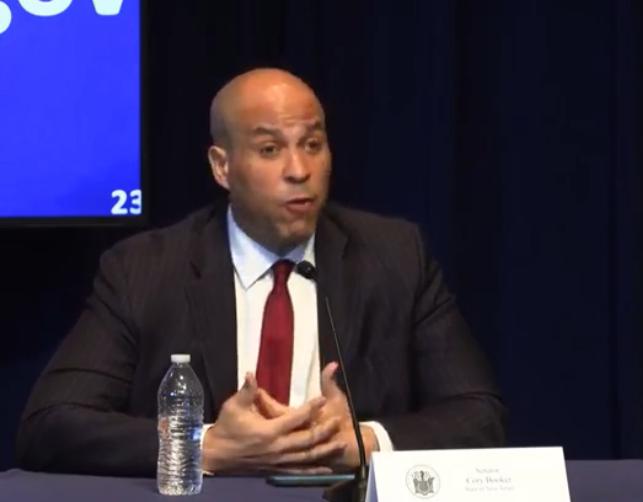Booker, Feinstein Introduce Bill to Help State, Local Prisons Test, Treat COVID-19

Booker, Feinstein Introduce Bill to Help State, Local Prisons Test, Treat COVID-19
Bill would incentivize states to reduce their prison populations amid Coronavirus pandemic
WASHINGTON, D.C.— U.S. Senators Cory Booker (D-NJ) and Dianne Feinstein, members of the Senate Judiciary Committee, today announced that they will introduce the COVID–19 Correctional Facility Emergency Response Act, which would allocate funds to state and local governments to provide testing and treatment for COVID-19 to individuals in state correctional facilities.
The bill would also incentivize states to reduce the number of people behind bars by curtailing arrests and in-facility processing for technical parole or probation violations and implementing “cite and release” procedures for individuals who do not pose a violent threat to the community.
Judiciary Committee Chairman Jerrold Nadler (D-N.Y.) introduced companion legislation in the House.
Last month, Booker introduced a bill that would move thousands of vulnerable people in federal facilities out of prison in order to better protect them from the pandemic.
“For people behind bars, contracting COVID-19 can be tantamount to a death sentence,” Senator Booker said. “Those in prison and jail tend to have much higher rates of underlying health issues than the general public, and the conditions of confinement make social distancing virtually impossible. The vast majority of these individuals are behind bars in state and local jails, so it’s critical that we provide states with the appropriate incentives and resources to fully and compassionately address this public health crisis. New Jersey has led the way with this approach and this legislation will hopefully spur other states to follow suit.”
“Correctional facilities have already started to become COVID-19 hotspots, and we must be more aggressive in stopping the spread of this virus in prisons and jails,” Senator Feinstein said. “Confined spaces and close quarters leave everyone vulnerable. We need to ensure that correctional facilities have everything they need to test and treat staff, inmates and detainees for COVID-19 as well as take other measures to prevent the virus’ spread. This is a public health emergency and we must protect everyone, including preventing a potential crisis in our correctional facilities.”
“The risk factors for COVID-19 spreading in prisons and jails are abundantly clear – close quarters, a large number of individuals who are medically vulnerable, and a limited availability of treatment,” Chairman Nadler said. “We must give states and local governments critical funding assistance to prevent the spread of this disease in these facilities, to test and treat inmates and those working in prisons, and to promote the reduction in prison populations so that fewer people are put at risk. These steps are urgently needed and are the right thing to do and I am pleased that Senators Feinstein and Booker are introducing the Senate companion to my House bill."
The COVID–19 Correctional Facility Emergency Response Act would:
- Provide states and local correctional facilities with funds to test and treat COVID-19 for all arrestees, detainees and others behind bars.
- Provide funds for COVID–19 testing for correctional facility staff, volunteers, visitors, attorneys, court personnel that have contact with people behind bars, law enforcement officers who transport people behind bars and personnel outside the correctional facility who provide medical treatment to people behind bars.
- Incentivize states to adopt programs that facilitate the reduction in the number of arrestees and people behind bars by curtailing booking and in-facility processing for individuals who have committed technical parole or probation violations and provide transition and reentry support services to individuals released.
- Authorizes a new grant program to adopt cite-and-release procedures for individuals who are suspected of committing misdemeanor and felony offenses and who do not pose a risk of serious danger to the community.
- Authorizes $1,000,000,000 for each of fiscal years 2021 and 2022 to implement these programs.
###





